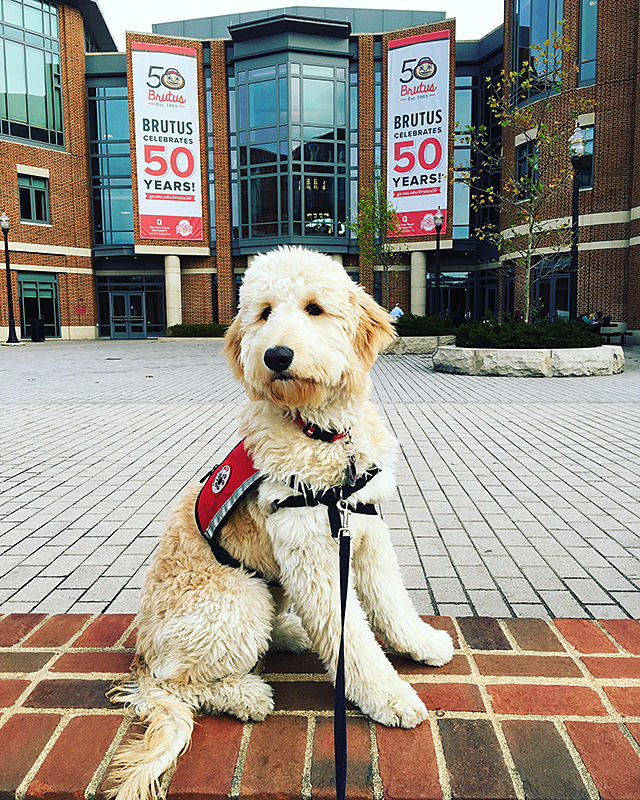OSU organization trains dogs for children with disabilities

Tadashi, one of Lynn Agee’s service dog in training, sits outside the Ohio Union. Credit: Lynn Agee
The puppies in red vests walking with their handlers around campus were born for this. From day one, they have been in training through 4 Paws for Ability to be service dogs for children with disabilities.
The time they spend at universities like Ohio State is one of many phases of their training before they get to meet the child they will serve.
Puppies that are born to be service dogs are handled and socialized from the very beginning through 4 Paws for Ability, said Jessa Kenworthy, senior trainer and university program coordinator for 4 Paws for Ability.
When they are between 12 and 14 months old, the puppies are sent to one of five prison programs, where they are matched with an inmate for four to six weeks who will teach them basic commands and doggie manners.
After they have a grasp on basic obedience, Kenworthy said the dogs are sent to a foster program, usually at a university.
“They’re with us for an entire semester and our job is pretty much to teach them how to be a dog in public places,” said Lynn Agee, a fifth-year in psychology and founder and president of 4 Paws for Ability Ohio State. “We keep up their obedience and then we can also teach them all kinds of tricks…they are going to be placed with children so they [the children] like the fun things.”
Each puppy is placed with a specific handler who takes the dog everywhere he or she goes go, whether that’s the grocery store, class, the movies or restaurants, Agee said.
It’s a 24/7 job for the handlers, who are in charge of socializing the puppy as well as taking care of its needs on a daily basis.
“Now you literally have a living, breathing creature that is living with you and needs to be fed, needs to be taken out, needs to be dressed and ready to go whenever you are,” Agee said.
In addition to getting the dogs used to adults, they need to go off campus to learn how to behave with children.
Agee said that one of the best places to do that is the mall, where children are eager to pet a puppy, which is good experience for the dog.
4 Paws for Ability Ohio State is also working to bring the dogs to local elementary schools to give them more opportunities to interact with children.
The student organization also holds and participates in events on campus where college students can interact with the dogs, too.
They recently participated in Howl-O-Ween, a Halloween fundraiser and informational event, and they often stop by places like the student veteran lounge just to “spread some love.”
“People are always really happy to see us and I think that’s really great,” Agee said. “A lot of people know to ask before (petting the dog) to make sure it’s okay that they interact.”
At the end of semester, the puppies must move on to the next part of their training and continue to prepare for their role as protector of a child.
After they leave the university, the dogs return to Xenia, Ohio, for a socialization assessment that determines if they need to brush up on basics or if they are ready to move to advanced training, Kenworthy said.
In advanced training, Kenworthy said, the trainers will take basic obedience and “make it more applicable to work as a service dog.”
Most of their dogs are trained as autism assistance dogs or seizure assistance dogs, but they can be trained for whatever their specific child and family need, Kenworthy said.
After mastering complex duties such as tethering, search and rescue, seizure alerting and retrieval, the dogs are ready to meet their forever family.
The family goes through a two-week intensive training period where they are taught how to be handlers and the child has a chance to bond with his or her new companion.
Finally, the experience culminates in a graduation, where everyone who helped train the dog is invited to wish the family well.
4 Paws for Ability Ohio State has grown from one dog to 20 in a year and a half and Agee said she sure the organization will continue to grow in the future.
“Our goal is just to accept everyone for who they are and allow them to experience having a companion that will change their life forever,” Agee said.


